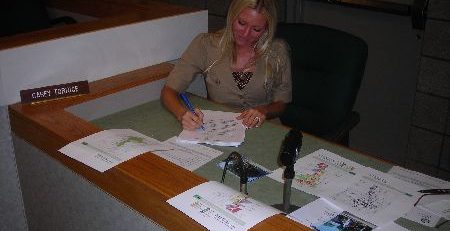Animal Shelter
PUBLISHED: Thursday, March 27, 2008
County to work with animal rescuers
Shelter explores alternatives to euthanizing strays
By Chad Selweski
Macomb Daily Staff Writer
County officials have agreed to work with several animal rescue groups to reduce the number of stray cats and dogs euthanized at the Macomb County Animal Shelter.
According to county Commissioner Carey Torrice, an advisory committee comprised of herself, three other county officials and five animal rescue groups will devise new policies and procedures at the shelter.
The goal is to increase the number of pet adoptions and to gradually decrease the 5,700 pets euthanized annually at the shelter – 80 percent of the cats received and nearly four in 10 dogs.
Last week, the county Board of Commissioners adopted a resolution that approved the concept of sharply reducing the reliance on euthanasia at the facility. Press coverage of that vote resulted in numerous calls to the shelter offering help.
Sue Jeroue, director of the shelter, said her facility has worked with some animal rescue groups in the past but the new approach looks promising and could slowly cut down on the number of animals that are put down.
I think we can probably make a dent in it, Jeroue said. The relationships we are establishing certainly put us on the right path.
The advisory committee will report on a regular basis to the Board of Commissioners’ Health Services Committee.
Torrice, the Clinton Township Democrat who authored the “”no-kill”” resolution, said the biggest breakthrough may be a partnership between the shelter and an Oakland County-based nonprofit group, Oakland Pet Fund, which offers access to a large group of volunteers.
You wouldn’t believe it. It looks like something is getting done quickly, Torrice said. What I’ve done in one week is more than what the commissioners have done in 15 years.
Debbie Schutt, board chair for the Oakland Pet Fund, said her group focuses on animal population control and pet adoptions. Last year they opened a clinic that spays and neuters animals, with an emphasis on neighborhoods where stray animals are prevalent.The group has also relied on the Internet and special events to secure adoptions, stressing the many pure-bred animals available in shelters. And they have created a foster care program that encourages senior citizens to take in stray cats.
I think that we have a difference in philosophy, said Schutt, whose group is affiliated with more than 30 volunteer groups and six municipal animal shelters in Oakland County. There are a lot of shelters that are doing the same things as they did 10, 15, 20











